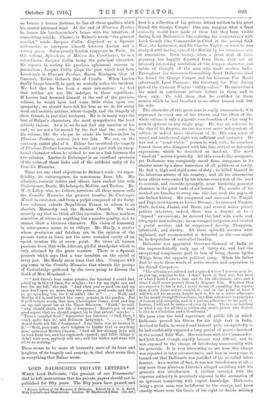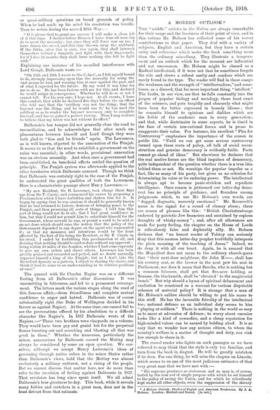LORD DALHOUSIE'S PRIVATE LETTERS.* WHEN Lord Dalhousie, "the greatest of
our Proconsuls," died he left instructions that his private papers should not be published for fifty years. The fifty years have passed, and
• Private Letters of the Marquess of Dalhousie. Edited by J. G. A. Baird. With Portraits and Illustrations. London: W. Blackwood & Sons. [Zs. net.]
here is a collection of his private letters written to his great friend Sir George Couper. One can imagine what a feast curiosity would have made of them had they been visible during Lord Dalhousie's life,—during his controversies with Lord Gough (the Commander-in-Chief in the second Sikh War), the Lawrences, and Sir Charles Napier, or when he was charged with having caused the Mutiny by his numerous acts of annexation. Even to-day, when a great deal of their piquancy has happily departed from them, they are an intensely interesting revelation of the temper, character, and habits of thought of the man who made modern India. Throughout his Governor-Generalship Lord Dalhousie used his friend Sir George Couper and his kinsman Fox Menlo (afterwards Lord Panmure, the Secretary for War during part of the Crimean War) as " safety-valves." He unburdened his mind in continuous private letters to them, and to them only. He told them that he confided in them secrets which lie had breathed to no other human soul but his wife.
The character of this great man is easily summarised; it is expressed in every one of his letters, and the effect of the whole volume is only a gigantic corroboration of what may be seen in epitome on any single page. He was an autocrat to the tips of his fingers; no one was ever more independent of advice, or indeed more intolerant of it. His own sense of moral and intellectual right was sufficient and exclusive. He was not a " comfortable " person to work with ; he somehow forced those who disagreed with him into critical or defensive expressions which he described as insolent. The word " insolent " occurs repeatedly. All this sounds like arrogance, yet Dalhousie was completely saved front arrogance in its sinister sense by a sheer innocence of all pettiness or vanity. He had a high and rigid sense of duty; be killed himself in the laborious service of his country; and all his dissensions from others were caused by his intense conviction of the need to override, and override promptly, some hindering personal elements in the great tasks of settlement. The results of his method are familiar to every one who has read the pages of our Indian history. He conquered and annexed the Prinjah and Pegu (now known as Lower Burma) ; he annexed Nagpur, Oudh, Sattara, Jhansi, and Berar, and several minor princi- palities (wherever, indeed, there was a dispute as to a "lapsed" succession); he covered the land with roads and telegraphs and railways; he encouraged irrigation and created a postal service; and he suppressed dacoity, Thuggism, infanticide, and slavery. All these splendid services were explained, and recommended or defended as the case might be, in despatches of unrivalled lucidity.
Dalhousie was appointed Governor-General of India at the unprecedentedly early age of thirty-six, and had the exceptional compliment paid to him of being chosen by the Whigs from the opposite political camp. When his father died he wrote these words of noble resolve and aspiration to his friend Couper :—
"The advantages natural and acquired which I possess may be, as you say, superior to his. I don't know if they are ; but most of what 1 have I owe to him and to his affectionate care, and I trust I shall never pervert them to disgrace him. Whether they are superior to his or not, I never dream of equalling his reputa- tion, I only desire not to tarnish it ; and in one point at least I will not soil his memory, bright as it is, for in a strict adherence to his manly straightforwardness, in a firm adherence to principles of honour and integrity, and in a jealous adherence to the path of honour, I will not be surpassed even by him. There is no boasting in what I say, for all this is within any man's power who desires to live as a Christian and a Gentleman."
We pass over the brief experience of public life in which
Dalhousie proved his fitness for his high task in India. Arrived in India, he soon found himself quite unexpectedly-- he had confidently expected a long period of peace—involved in the second Sikh War. His relations with his Commander- in-Chief, Lord Gough, rapidly became very difficult, and he was exposed to the charge of interfering unnecessarily with his generals. It is very interesting to see how this charge was repeated in later circumstances, and how in every case it turned out that Dalhousie was justified of his so-called inter- ference. As a matter of fact, it was not interference at all,— any more than Abraham Lincoln's alleged meddling with his generals was interference. A civilian invested with the supreme authority is peculiarly exposed to the accusation of an ignorant tampering with expert knowledge. Dalhousie, being a great man, was indifferent to the charge, and knew exactly where were the limits of his right to decide military or quasi-military questions on broad grounds of policy. When he had made up his mind his resolution was terrific.
Thus he writes during the secor d. Sikh War :—
" If it please God to grant me success I will make a clean job of it this time. I declare before Heaven I have done all man can do to avert the necessity ; but since they will force war on me, I have drawn the sword, and this t ime thrown away the scabbard. If the Sikhs, after this is over, rise again, they shall intrench themselves behind a dunghill, and fight with their finger-nails, for if I live 12 months they shall have nothing else left to fight with."
Explaining one instance of his so-called interference with Lord Gough, Dalhousie wrote :—
" On nth and 13th I wrote to the C.-in-C., as I felt myself bound to do, strongly impressing upon him the necessity for using the vast means he bad, and warning him at once against the past, and of what I expected for the future. By my word it was time for me to do so. He has been furious with me for this, and declared he would resign in consequence. Whether he will do so or not I cannot tell. For his own sake, I hope not. At all events, I have this comfort, that while he declared five days before (to an officer who told me) that the 'artillery was not the thing ; that the bayonet was the thing, and he would use it,' he has used the artillery so as to render the bayonet necessary only to complete his work, and has so gained a perfect victory. Thus I may venture to believe that my letter was not without its effect."
Dalhousie's hot temper did not generally close the road to reconciliation, and he acknowledges that after much un- pleasantness between himself and Lord Gough they were both glad to "kiss and he friends" again. The Lawrences, as is well known, objected to the annexation of the Punjab. It seems to us that the need to establish a government on the ruins was essential ; in other words, provisional annexation was an obvious necessity. And when once a government had been established, its beneficial effects settled the question of principle. The Punjab system was afterwards applied to the other territories which Dalhousie annexed. Though we think that Dalhousie was certainly right in the case of the Punjab, he underrated the great qualities of both the Lawrenees.
Here is a characteristic passage about Hen .7 Lawrence :—
"My new Resident, Sir H. Lawrence, took charge three days ago from Sir F. Currie, and commenced his career by proposing a Proclamation which I have forbidden and shaken him for it. It began by saying that he was anxious it should be generally known that he had returned to Lahore, desirous of bringing peace to the Punjab, and then promising all sorts of things. I told him this sort of thing would not do at all ; that I had groat confidence in him, but that I could not permit him to substitute himself for the Government., whose servant he was, or permit a word to be said or an act done which should raise the notion that the policy of the Government depended in any degree on the agent who represented it ; or that my measures and intentions would be the least affected by the fact of his being the Resident, or Sir F. Currie in his stead. I ended by forbidding this proclamation at all, and desiring that nothing should be said or done without my approval— being within 50 miles of the frontier, whither I had come expressly to give my own orders and direct others. Lawrence has been greatly praised and rewarded and petted, and no doubt naturally supposes himself a king of the Punjab ; but as I don't take the Brentford dynasty as a pattern, I object to sharing the chair., and think it best to come to an understanding as to relative positions at once."
The quarrel with Sir Charles Napier was on a different footing from all Dalhousie's other dissensions. It was unremitting in bitterness, and led to a permanent estrange- ment. The letters mark the various stages along the road of this famous affair,—from friendliness and complete mutual confidence to anger and hatred. Dalhousie was of course substantially right (the Duke of Wellington decided in his favour as against Napier). At the same time, one cannot fail to see the provocations offered by his absolutism to a difficult character like Napier's. In 1857 Dalhousie wrote of the Napiers :—" These two brothers were vineyards on a volcano. They would have been gay and genial but for the perpetual flames bursting out and scorching and blasting all that was good in them." Whether the numerous, particularly the minor, annexations by Dalhousie caused the Mutiny may always be considered by some an open question. We our- selves, although we accept Henry Lawrence's ideas of governing through native rulers in the minor States rather than Dalhousie's views, hold that the Mutiny was almost exclusively a military outburst, not a rising of the people. But we cannot discuss that matter here, nor do more than refer to the revulsion of feeling against Dalhousie in 1857. That revulsion has long since spent itself. We all admit Dalhousie's true greatness to-day. This book, while it reveals many foibles and crotchets in a great man, does not in the least detract from that estimate.















































 Previous page
Previous page